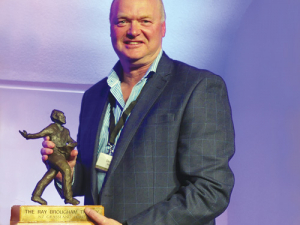NZ scientists make breakthrough in Facial Eczema research
A significant breakthrough in understanding facial eczema (FE) in livestock brings New Zealand closer to reducing the disease’s devastating impact on farmers, animals, and rural communities.
 Professor Derrick Moot received the New Zealand Grassland Trust’s highest research accolade, the Ray Brougham Trophy, at last week’s conference in Timaru.
Professor Derrick Moot received the New Zealand Grassland Trust’s highest research accolade, the Ray Brougham Trophy, at last week’s conference in Timaru.
The recent New Zealand Grassland Association “packed” its annual conference with papers promising productivity gains and environmental solutions for pastoral farmers, the organisers say.
The conference, held on Nov 2-4 in Timaru, attracted just over 300 delegates from across the country, including many leading scientists. Papers presented covered crops from fescue to fodder beet and lupins to lucerne.
Association president David Stevens, AgResearch, said it was a great event heralding ground-breaking science presented and offering popular farm-visit field days.
Those field days included two robotic dairy farms and a dryland finishing property on the first day of the conference, followed by a progressive dryland sheep and beef property and an irrigated finishing farm on day two.
The field days helped scientists see previous research being put into practice and hear what challenges local farmers face that might merit research. The morning sessions relayed the latest findings.
“What we are here for is science and that’s what we endorse,” said Stevens in his closing comments to the conference. “The association does not endorse products, processes or cultivars. We are here for debate and we welcome that.”
Increasingly pastoral research is being done, or at least controlled, by commercial entities, so Stevens encouraged these to submit their work to the independent peer-review process the NZGA provides. If it proves scientifically sound it will make it into the conference programme and the associated journal, he said.
“It’s a really important part of our future…. A lot of the pastoral sector’s science is now conducted outside our formal institutions and we welcome our industry partners putting that science up here at the conference.”
At the conference dinner the association’s sister body, the New Zealand Grassland Trust, made four awards, the top accolade going to Lincoln University professor Derrick Moot who received the Ray Brougham Trophy.
Moot had been instrumental in the economic, social and environmental transformation of pastoral farms in the dry east thanks to his outstanding research and communication skills, said Grasslanz’ John Caradus.
The farmer awards went to dairy farmers Alvin and Judith Reid, whose robotic dairy farm at Pleasant Point was among the field day stops, and sheep and beef farmers Warren and Andrea Leslie.
Former farm consultant, now Irrigation New Zealand chair, Nicky Hyslop won the trust’s regional award.
“It would be fair to say her influence has helped many farms in the region raise their productivity substantially over nearly two decades,” said Caradus.
Next year’s conference will be held in Whanganui from November 7-9. All papers from this year’s conference are posted on www.grassland.org.nz under proceedings.
Former Fonterra executive Alex Turnbull has been appointed CEO to lead all five Yili Oceania Business Division companies in New Zealand.
Fonterra executive René Dedoncker is leaving the co-operative later this year to lead Australian agribusiness Elders.
Alliance Group and the Southland Stags rugby team have joined forces in a partnership that will see the the meat co-operative's farmgate brand feature on players' team kits and replica jerseys.
Fonterra's plan to expand its organic programme to the South Island is being well received by farmers, the co-op says.
Voting has started for the renewal of DairyNZ's milksolids levy.
The most successful catchment groups in NZ are those that have 'a source to sea' approach.

OPINION: Here w go: the election date is set for November 7 and the politicians are out of the gate…
OPINION: ECan data was released a few days ago showing Canterbury farmers have made “giant strides on environmental performance”.